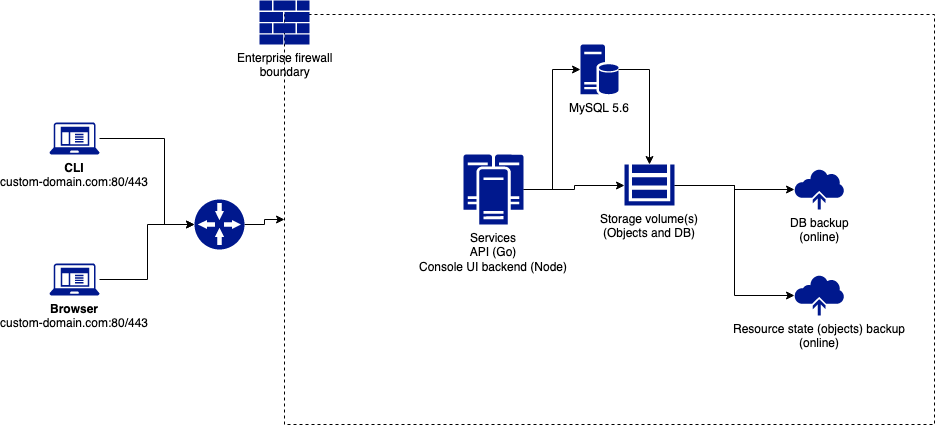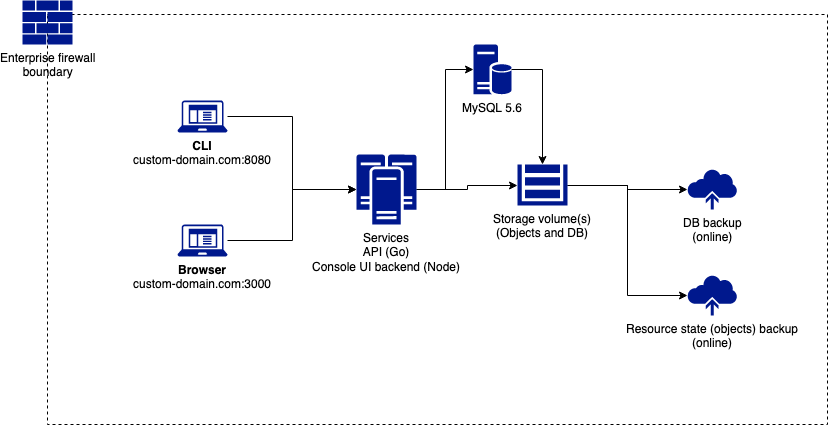Self-hosting the Pulumi Cloud
This guide presents the overall architecture for self-hosting the Pulumi Cloud as well as available reference architectures and related installers.
Managed Pulumi Cloud vs Self-Hosted Pulumi Cloud
Pulumi Cloud (i.e., app.pulumi.com) is a fully managed SaaS providing state management, a secrets manager and features such as single sign-on (SSO), audit logs, centralized stack and policy management to name a few. As a SaaS, Pulumi manages all aspects of the service.
The self-hosted version of the service provides all the same capabilities as the SaaS offering. The self-hosted deployment requires that the customer manages data backups and keeping the service running and up to date. However, the self-hosted solution allows the customer to run the service fully within their own environment.
If you are unsure about whether a self-hosted version of the Pulumi Cloud is right for your organization, contact us to learn more.
Deployment Topology
Pulumi can be installed in almost any on-premise or cloud provider environment. The self-hosted install can be integrated with your preferred identity provider as well, such as:
- GitHub Enterprise
- GitLab Enterprise
- SAML SSO
- Email/password identity
Here are some examples of deployment topologies:

Internet-Accessible Deployment

Intranet-Only Deployment
For information on ingress and egress from the self-hosted Pulumi Cloud, please see the network requirements information.
Deployment Options
The Pulumi Cloud Docker container images can be run using any OCI-compatible container orchestrator.
However, Pulumi provides installers to support common deployment environments:
- Quickstart Docker Compose: Using a Pulumi-provided set of docker-compose files and bash scripts, one can deploy a small system for testing in a local Docker environment.
- ECS-Hosted: Using a Pulumi-provided set of Pulumi programs written in TypeScript or Go, one can automate the deployment and maintenance of a production-grade self-hosted solution.
- EKS-Hosted: Using a Pulumi-provided set of Pulumi programs written in TypeScript, one can automate the deployment and maintenance of a production-grade self-hosted solution running on Amazon Elastic Kubernetes Sevice (EKS). This solution most closely matches the managed service deployment model.
- AKS-Hosted: Using a Pulumi-provided set of Pulumi programs written in TypeScript, one can automate the deployment and maintenance of a production-grade self-hosted solution on Azure Kubernetes Service (AKS).
- GKE-Hosted: Using a Pulumi-provided set of Pulumi programs written in TypeScript, one can automate the deployment and maintenance of a production-grade self-hosted solution on Google Kubernetes Engine (GKE).
- Bring Your Own Infrastructure: Using a Pulumi-provided set of Pulumi programs written in TypeScript, one can automate the deployment and maintenance of a production-grade self-hosted solution on your own K8s, MySQL and S3-compatible storage,.
- Local-Docker: Using a Pulumi-provided Pulumi program written in TypeScript, one can automate the deployment and maintenance of a production-grade self-hosted solution using a customer-provided docker environment, a customer-provided MySQL database and a customer-provided object store (e.g. Minio).
Components
The Pulumi self-hosted Components consist of Docker images for the Pulumi Cloud’s frontend UI and backend API.
Requirements
The self-hosted Pulumi Cloud has several requirements to enable it to be installed and run on your infrastructure.
Thank you for your feedback!
If you have a question about how to use Pulumi, reach out in Community Slack.
Open an issue on GitHub to report a problem or suggest an improvement.
